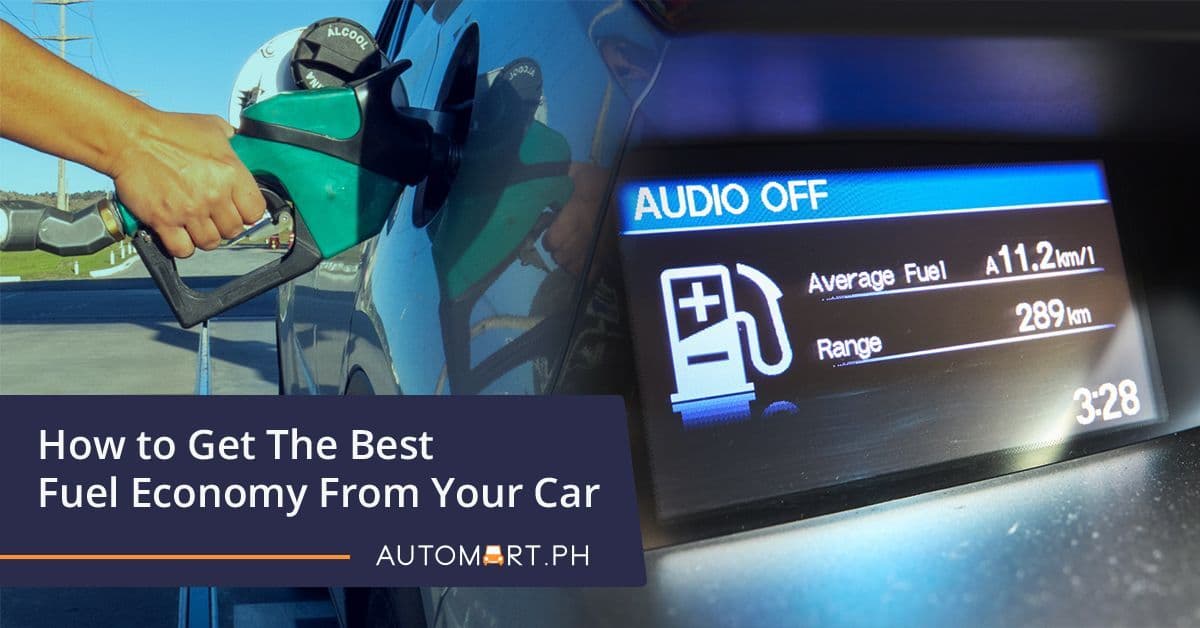
Gas Mileage Tips: How to Get the Best Fuel Economy
Updated on March 01 2026
Gas prices are as volatile as the stock market. With no end in sight to rising fuel costs, it is your responsibility to save as much fuel as you can as a car owner. Here are some helpful tips to increase gas mileage and get the best fuel economy from your car, truck, MPV, or SUV.
What’s the best way to save gas?
The first step is to purchase a fuel-efficient car like the Toyota Wigo, Mitsubishi Mirage, or Hyundai Eon. But if you have an older car or a large and heavy SUV, an essential factor to save gas is to modify your driving habits. If you have a habit of incessantly stepping hard on the gas pedal, your vehicle will gurgle gas like a thirsty hippo, no matter if you have a compact practicar or a diesel truck or SUV.

Besides taking it easy with the gas pedal, there are other things to keep in mind if you’re looking to save gas. Here are tips to help increase your gas mileage so you can save money at the gas pump.
How to Get the Best Fuel Economy
1. Drive slower than usual.
Your vehicle consumes more fuel the faster you go. And besides, there are speed limits on most Philippine roads, so there’s no point in rushing it and breaking the law. According to studies conducted by ConsumerReports.org, reducing highway speeds from 120 kph to 100 kph will increase fuel mileage by up to 3 kilometers per liter, a significant amount. Taking it easy with your throttle inputs is the best and easiest way to save gas.
2. Avoid hard acceleration and sudden braking.
Avoiding frequent bursts of acceleration will also save fuel. Unless you’re driving on a race track, keep it steady when pulling from a stop. The same rule applies when it comes to braking. Drive smoothly and do your best to anticipate the traffic movement. Remember that smooth acceleration and braking will also help extend the life of your car’s engine, tires, and transmission.
3. Keep it light.
Did you know that carrying 45 kilos of weight will reduce fuel economy by up to one percent on average? Keep in mind that the cargo weight will affect the fuel economy of smaller cars more than larger vehicles. If you want to save fuel, it is best to remove any unnecessary items from your car. Also, avoid carrying heavy objects or cargo on the roof whenever possible. Remember that more than 50-percent of engine power is needed to overcome aerodynamic drag at highway speeds. The less you carry, the more fuel you stand to save.
4. Keep the air-conditioning ON while on the highway.
Modern cars will generally consume more gas when the air-conditioning is running. But since the A/C contributes to driving comfort, the trade-off is negligible. But if you have a habit of driving on the highway with the windows down, your car will generally consume more fuel. Why? You can blame aerodynamics for that. It’s typically acceptable to drive with the windows down at slower speeds, but you can save more fuel if you use the A/C at highway speeds, and that’s a fact.
5. Maintain the proper tire pressure.
In a study conducted by the U.S. Department of Energy, you can improve your car’s gas mileage by up to 3.3-percent if you drive with properly inflated tires. What’s more, you can lose up to 0.1-percent of gas mileage for every one psi missing from all four tires. In addition, every psi lost means your tires will wear 10-percent faster than usual. The proper tire pressure is from 30 to 32 psi for most cars. Check the owner’s manual of your vehicle to be doubly sure, and make certain to check the tire pressure at least once a week.
6. Avoid unnecessary idling.
You see this all the time at parking lots. Allowing your engine to idle incessantly will not only affect your gas mileage, but it contributes to accelerated wear and tear on vital engine components. Did you know that your car will consume up to 1.8 liters of fuel for every hour of idling? It’s a good habit to turn off the engine if you stop for more than a minute or two.
7. Choose the proper engine oil.
Yes, the type of oil inside your car’s engine is a determining factor in saving gas. Are you aware that using the wrong kind of engine oil will reduce fuel economy by an average of one to two percent? Before changing the oil in your car, read the owner’s manual to determine what type of oil is best for your vehicle. If the manufacturer recommends 0W-30 grade oil, filling the engine with “thicker” 10W-30 oil will result in poor fuel economy.
Save Gas, Save Money
Until humanity finds a way to replace fossil fuel as a primary energy source, you can do the planet a huge favor by saving as much fuel as you can when using your car. If you follow the gas-saving tips above, you will save money while prolonging the life of your precious ride.